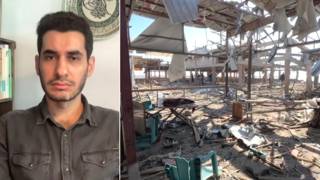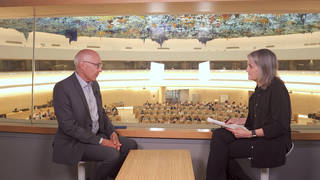
We continue our conversation looking at “Left Internationalism in the Heart of Empire,” which is the title of a recent essay in Dissent magazine by Aziz Rana, law professor at Cornell University and the author of the book “The Two Faces of American Freedom.” We are also joined by Darryl Li, professor at the University of Chicago and author of “The Universal Enemy: Jihad, Empire, and the Challenge of Solidarity.” Li is one of a number of scholars who wrote a response to Rana’s essay in the special issue of Dissent magazine on foreign policy.
Transcript
AMY GOODMAN: This is Democracy Now!, democracynow.org, The War and Peace Report. I’m Amy Goodman, with Nermeen Shaikh, as we continue with Part 2 of our conversation about, well, “Left Internationalism in the Heart of Empire.” That’s the title of an essay in Dissent magazine by Aziz Rana, law professor at Cornell University and author of the book The Two Faces of American Freedom. We’re also joined by Darryl Li, a professor at University of Chicago, author of the book The Universal Enemy: Jihad, Empire, and the Challenge of Solidarity. Darryl Li is one of a number of scholars who wrote a response to Professor Rana’s essay in a special issue of Dissent magazine on foreign policy.
So, Darryl, we were last talking to you, in Part 1 of our conversation, the problem of building networks of global solidarity on the left around foreign policy. More obviously, at home, progressives are more united on issues of how to deal with immigration, climate, how to take on issues, say, for example, of reproductive rights and abortion. What does that look like internationally, and specifically focused on foreign policy?
DARRYL LI: Well, actually, I was going to expand on a slightly different point that Aziz was making, which is connecting the international and the domestic. And I think when it comes to immigrant rights, this is a very important and often missed opportunity. We know from the history of the Cold War that there’s always been the possibility of people coming over from other parts of the world where their experiences with other regimes and other places leads them to embrace kind of the U.S. national security establishment, right? So, we think of, of course, the example of the Cuban and Iranian, Vietnamese émigré populations.
So I think one important place for the left to be looking, going forward, is organizing with immigrant populations, including from places such as Afghanistan, with all the people who were resettled after the U.S. evacuation, but to do so in a way that really challenges the kind of U.S. exceptionalism and aspiration to whiteness that often dominates immigrant rights discourses, right? We want to think about all of the different diasporas that are here in the United States as potential vectors to connect with communities all around the world, but to do so in a way that much more critically kind of engages with their place inside the United States, their relationship to settler colonialism, to anti-Blackness, and, as well, in more critically interrogating and rejecting the imperialist aspirations of the United States around the world.
NERMEEN SHAIKH: Darryl, could you respond also to Amy’s question about — which is the focus of some of your work — the difficulties of building networks of global solidarity on issues related to foreign policy, given the fact, as you were saying in Part 1 of our interview, that the position the left takes is determined, in part or substantially, by where the person is in the world? In other words, someone in Karachi will not have the same position — a left person in Karachi will not have the same position as someone in New York or in Lima or in Tokyo.
DARRYL LI: I think too often folks on the left, I think, tend to assume that there is one correct left position that applies to leftists all around the world. And as you point out in your question, that’s not really a tenable proposition. And I think recognizing that there are different interests at stake is the first step to figuring out where you can find common ground and to work from there. Too often, as Aziz was alluding to earlier, we just tend to ignore that those people exist, or sometimes even dismiss or demonize them. So that’s clearly an ongoing problem.
NERMEEN SHAIKH: Aziz, I want to go back to a point that you made in the first part of our interview, where you, of course, laid out what the failures of U.S. foreign policy have been since — minimally, since 1945. And although you say that in some instances — and Ukraine is the most recent example — military support can’t be entirely ruled out, you also say, correctly, that it’s a problem that that military support, in the case of U.S. military support for Ukraine, is now not just defensive support — in other words, defending Ukraine against Russian aggression — but has actually become about far more, as you said in Part 1, about weakening Russia, an adversary of the U.S., strengthening the U.S. position in Europe and so on. Given the history that you yourself outline of U.S. interventions around the world and their egregious effects, isn’t it inevitable that U.S. policies and objectives in the event of any kind of intervention would include its own interests, that, in fact, often, if not uniformly, are problematic for the region?
AZIZ RANA: So, you know, I don’t — I don’t really disagree. If you just look at the long history of American interventionism, from various forms of military support through to boots on the ground, airstrikes, it’s a history, really, of coercive violence and various kinds of rights violations that have been pretty destructive. And you can tell that story dating back to ’45. You can tell that story as a story of the long history, really, of American settler colonialism, linking the experience on the frontier domestically to what ends up being American global power overseas.
So, I do think that there’s a set of national security dynamics that almost always combine — and we’re seeing this again — geostrategic interests that are built around American primacy and the projection of American power with whatever that’s taking place locally, in ways that end up undermining oftentimes meaningful local aspirations. I think that is the background story. And I think it means that as a basic position, the position should be one, domestically, of saying to the — saying in the context of various new conflicts and crises that the underlying approach vis-à-vis what the state is doing is a principle of “do no harm.” To what extent is the state operating in a way that’s actually facilitating, expanding various forms of humanitarian crisis, conflict and violence, and then contesting those actions?
Now, even though that’s the background, bedrock assumption, that doesn’t mean that there are no circumstances under which one might still say, actually, it’s important for, you know, foreign states to provide various kinds of military assistance. I would say, for instance, as an exception, that the story in the early 1990s about the war in Bosnia, where you had, essentially, a Serbian invasion, and then you had a policy that was more or less an arms embargo. So, not providing arms assistance to Bosnians on the ground helped set the stage for ethnic cleansing and had various kinds of deleterious consequences. And then the failure to provide military assistance, that would have been defensive military assistance, then became a justification later on for an illegal bombing campaign in Kosovo that initiated two decades-plus, really, of sustained U.S. rule defection.
And the reason why it’s important to be able to note that you can’t have a totalizing policy of nonintervention is because it’s important, I think, in articulating a clear alternative, not just to be framed by what the state does, but to actually articulate, well, how is it, if you in fact had left forces in charge of a powerful state, would they respond. And I think the appropriate response in a setting like Ukraine or in a circumstance like what I described with Bosnia would be defensive military assistance combined with an effort to pursue, in a sustained and rigorous way — excuse me — peaceful resolutions that deal with the humanitarian effects both within the local setting and also globally.
One of the reasons why it’s important to lay that out is because it’s useful as a way of then juxtaposing against what in fact the U.S. state does, and that the U.S. state, precisely by combining what might be legitimate calls for anti-imperialism and local self-determination with its grander geostrategic interest in global primacy, ends up pursuing policies that I think push in escalatory and militarized directions that can be quite harmful. But it’s important to be able to still carve out space that’s not just totalizingly noninterventionist and that also is able to establish, well, what would be the kind of principled alternative that’s between these poles of nonintervention and then simply accepting what the U.S. does, especially in a world that’s moving further and further towards multipolarity.
And just as a last thing on Darryl’s point about solidarity, which I absolutely underscore, that I think it is important to recognize that what the — a left position in the U.S. might be very different than a left position in Ukraine or, let’s say, in Syria, where it might make a lot of sense for folks on the ground in places like Ukraine and Syria to even want to have American or Western military intervention or stronger forms of support as a response to what their own conditions and circumstances are. That may be one of the live positions. But in the U.S., I think the orientation has to be: Well, what is it that our state does, and what responsibilities do we have vis-à-vis how our state operates? And that’s why the principle of “do no harm” has to take center stage and might countenance having a far more restricted and limited set of involvements by the U.S. than what, you know, allies elsewhere might want. But one of the ways to navigate those differences and cleavages is to have frameworks put in place where the first time you’re interacting with somebody that is a leftist in Syria or a leftist in the Ukraine is not in the context of a crisis but through background sets of arrangements in which there’s a kind of commonality and recognition of shared commitment and interest.
AMY GOODMAN: Darryl Li, if you could respond to what Aziz Rana is saying, and also, before we end, bring China into this picture? I mean, there was just this NATO meeting in Madrid, protests outside the meeting. And they brought in for the first time Japan, South Korea, Australia, New Zealand, clearly as a show of force against China.
DARRYL LI: Yeah, I think I agree with everything that Aziz just said, namely, that solidarity sometimes requires disagreement and sometimes requires saying no. But doing so as part of an ongoing conversation, as Aziz was alluding to, is very different than doing it kind of as an act of dismissal. And similarly, it’s very important not to be antiwar only when the jets are being scrambled, as it were. The case of ex-Yugoslavia, as Aziz is pointing out, is an excellent example of this. The U.S. is always already intervening, right? And oftentimes in situations where they don’t have a clear proxy on the ground, sometimes the strategy is to essentially bleed both sides out. They did this during the Iran-Iraq War in the 1980s. This was, to a certain extent, the policy in ex-Yugoslavia in the '90s of preventing Bosnian Muslims or the Bosnian state from arming itself, while then setting itself up, setting NATO up as kind of the cavalry to come in at the end of the day. And, of course, it was the policy in Syria, as well. So, this is — it's extremely important. And again, this is the sort of thing that if you had an ongoing conversation with left movements on the ground, you would have a better sense of and be able to sort of — to sort of wrap your head around.
As far as China is concerned, you know, it’s not — I’m not an expert on it, but it just stands to common sense that all of the dilemmas that we’ve been talking about in terms of what does it mean to be a person on the left in the West in an era of multipolarity, all those dilemmas seem to be magnified and intensified by, you know, an order of magnitude, if we think about the continuing rise of the power of the Chinese state and its relationship with the United States. I think all sorts of populations on both sides of the Pacific are at risk of being victimized by this dynamic, albeit in very different ways, everything from, of course, you know, what’s happening in Xinjiang and in Hong Kong, Taiwan, with their own different crises, as well as Asian American populations and the violence against them, you know, in the wake of COVID. So, this is all to say that the dilemmas that we’ve been talking about, looking backwards over the past 30 years, are in some ways very small dress rehearsals for the dilemmas and the crises that will probably be coming down the pike.
NERMEEN SHAIKH: And finally, Darryl, do you see any signs of an emerging global solidarity movement on issues of foreign policy?
DARRYL LI: Um, I’m not sure if I do. But I think, as Aziz alluded to earlier, it’s not — I think, usually, when two professors get together to talk about something, it’s because it’s already happened out there in the world, right? So we’re not exactly the best people to go to on this.
In my own research, I’ve attempted to address this question of “What does it mean to organize, you know, on some sort of basis of transnational solidarity in the face of U.S. empire? And what does it mean to do so with guns, with weapons?” And for that reason, my research led me to look at transnational jihad movements. That’s not normally how they’re approached. Normally, they’re seen as kind of a security problem or a problem with, you know, what’s wrong with Islam. But in my own academic research, I’ve been kind of trying to think about what kinds of lessons can a global left learn from these previous mobilizations. You know, they’re obviously coming at it from a very different perspective, and I’m not at all suggesting that they are to be emulated. But I think they have, at the very least, attempted to take on these challenges. And that’s something, unfortunately, that a lot of folks who identify with the left have tended to shy away from.
AMY GOODMAN: We want to thank you both for being with us, Darryl Li, anthropologist, professor at the University of Chicago, author of the book The Universal Enemy: Jihad, Empire, and the Challenge of Solidarity, and Aziz Rana, a professor at Cornell University. His major Dissent article in their new issue is headlined “Left Internationalism in the Heart of Empire.” We’ll link to the essay and all of the response, including Professor Darryl Li’s.
To see Part 1 of our discussion, go to democracynow.org. I’m Amy Goodman, with Nermeen Shaikh. Thanks so much for joining us.












Media Options